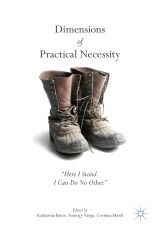Details

Dimensions of Practical Necessity
“Here I Stand. I Can Do No Other."|
96,29 € |
|
| Verlag: | Palgrave Macmillan |
| Format: | |
| Veröffentl.: | 20.04.2017 |
| ISBN/EAN: | 9783319523989 |
| Sprache: | englisch |
Dieses eBook enthält ein Wasserzeichen.
Beschreibungen
This collection of essays provides the first systematic investigation of practical necessity and offers novel perspectives on this intriguing phenomenon. While debates on necessity often take place in the realm of metaphysics, there is a form of necessity that is pertinent to practical philosophy. “Here I stand. I can do no other,” a phrase habitually attributed to Martin Luther, is often interpreted as revealing underlying normative reasons that exhibit a special kind of necessitating force, experienced as an inescapable constraint by the agent. However, one of the features that make this phenomenon so fascinating is that this constraint is often deciphered as stemming from a form of necessitation that articulates the agent’s autonomy or practical identity. Luther’s saying serves as a leitmotif for an exploration of different claims and challenges related to practical necessity. As the complex philosophical investigations are based on familiar, everyday experiences the book is accessible to any academic readership.<p></p>
<p><i>1. Dimensions of Practical Necessity: An Introduction </i></p>
<p><b>Part I. Examples: The Necessity of Love and the Unforgivable</b></p>
<p><i>2.</i> <i>Loving Eyes of My Own: Love, Particularity, and Necessity</i> (Marya Schechtman)<i></i></p>
<p><i>3. “I cannot forgive you.” The Unforgivable as an Example of a Practical Necessity </i>(Oliver Hallich)<i></i></p>
<p><b>Part II. Normative Claims: Personal Practical Necessity and Practical Identities</b></p>
<i>4. Christine Korsgaard and the Normativity of Practical Identities</i> (Christoph Bambauer)</p>
<p>5. <i>What if I Cannot Do What I Have to Do? Notions of Personal Practical Necessity and the Principle “Ought Implies Can” </i>(Michael Kühler)</p>
<p><b>Part III. Normative Challenges: Vice and Akrasia</b></p>
<p><i>6. Vice, Practical Necessity, and Agential Self-Destruction</i> (Jonathan Jacobs)</p>
<p><i>7. Three Ways to Understand Practical Necessity and </i>akrasia<i>: Aristotle, Davidson, and Frankfurt</i> (Kathi Beier)<i></i></p>
<p><i>8. Here I stand, I could do other: Can a Person of Integrity Be Weak-Willed?</i> (Arnd Pollmann)<i></i></p>
<p><b>Part IV. Volitional and Psychological Challenges: Ambiguity, Psychopathy, and Shame</b></p>
<i>9. Where? Me? Indeterminacy and Ambiguity in Human Motivation</i> (Jan Bransen)<i></i></p>
<p><i>10. Shame and Necessity </i>Redux (Heidi Maibom)</p>
<b>Part V. Concluding Evaluations</b></p>
<p><i>11. Here I Stand: About the Weight of Practical Necessity</i> (Katharina Bauer)<i></i></p>
<p><i>12. Morality and Happiness: Two Precarious Situations?</i> (Corinna Mieth)<i></i></p>
<i> </i></p>
<p> </p>
<p><b>Part I. Examples: The Necessity of Love and the Unforgivable</b></p>
<p><i>2.</i> <i>Loving Eyes of My Own: Love, Particularity, and Necessity</i> (Marya Schechtman)<i></i></p>
<p><i>3. “I cannot forgive you.” The Unforgivable as an Example of a Practical Necessity </i>(Oliver Hallich)<i></i></p>
<p><b>Part II. Normative Claims: Personal Practical Necessity and Practical Identities</b></p>
<i>4. Christine Korsgaard and the Normativity of Practical Identities</i> (Christoph Bambauer)</p>
<p>5. <i>What if I Cannot Do What I Have to Do? Notions of Personal Practical Necessity and the Principle “Ought Implies Can” </i>(Michael Kühler)</p>
<p><b>Part III. Normative Challenges: Vice and Akrasia</b></p>
<p><i>6. Vice, Practical Necessity, and Agential Self-Destruction</i> (Jonathan Jacobs)</p>
<p><i>7. Three Ways to Understand Practical Necessity and </i>akrasia<i>: Aristotle, Davidson, and Frankfurt</i> (Kathi Beier)<i></i></p>
<p><i>8. Here I stand, I could do other: Can a Person of Integrity Be Weak-Willed?</i> (Arnd Pollmann)<i></i></p>
<p><b>Part IV. Volitional and Psychological Challenges: Ambiguity, Psychopathy, and Shame</b></p>
<i>9. Where? Me? Indeterminacy and Ambiguity in Human Motivation</i> (Jan Bransen)<i></i></p>
<p><i>10. Shame and Necessity </i>Redux (Heidi Maibom)</p>
<b>Part V. Concluding Evaluations</b></p>
<p><i>11. Here I Stand: About the Weight of Practical Necessity</i> (Katharina Bauer)<i></i></p>
<p><i>12. Morality and Happiness: Two Precarious Situations?</i> (Corinna Mieth)<i></i></p>
<i> </i></p>
<p> </p>
Somogy Varga (PhD, Goethe Universität, Frankfurt am Main) is associate professor of philosophy at the University of Memphis. His primary areas of research are philosophy of psychiatry/mind, moral psychology and social philosophy. His publications include <i>Authenticity as an Ethical Ideal</i> (Routledge 2011) and<i> Naturalism, Interpretation, and Mental Disorder</i> (Oxford University Press 2015).<div><br></div><div><div>Katharina Bauer, Dr. phil., is a Feodor-Lynen Fellow of the Humboldt Foundation at Rijskuniversiteit Groningen. In 2016 she has completed her habilitation thesis about theories of practical necessity as a research scholar of the “Deutsche Forschungsgemeinschaft (DFG)”. She is the author of E<i>inander zu erkennen geben. Das Selbst zwischen Erkenntnis und Gabe</i> (Alber 2012).</div><div><br></div><div>Corinna Mieth is Professor for Political Philosophy and Philosophy of Law at the Ruhr-University of Bochum (Germany). Her main areas of specialization are positive duties, human rights and human dignity, global justice, world poverty, and moral dilemmas. She is the author of <i>Positive Pflichten (Positive Duties). Über das Verhältnis von Hilfe und Gerechtigkeit in Bezug auf das Weltarmutsproblem </i>(de Gruyter 2012).</div><div><br></div></div>
This collection of essays provides the first systematic investigation of practical necessity and offers novel perspectives on this intriguing phenomenon. While debates on necessity often take place in the realm of metaphysics, there is a form of necessity that is pertinent to practical philosophy. “Here I stand. I can do no other,” a phrase habitually attributed to Martin Luther, is often interpreted as revealing underlying normative reasons that exhibit a special kind of necessitating force, experienced as an inescapable constraint by the agent. However, one of the features that make this phenomenon so fascinating is that this constraint is often deciphered as stemming from a form of necessitation that articulates the agent’s autonomy or practical identity. Luther’s saying serves as a leitmotif for an exploration of different claims and challenges related to practical necessity. As the complex philosophical investigations are based on familiar, everyday experiences the book is accessible to any academic readership.<p></p>
<p>Brings together prominent international experts to provide the first systematic investigation of practical necessity.</p><p>Offers a multi-perspective analysis of this crucial concept in contemporary philosophical debates.</p><p>Contributes to debates on practical identity, motivational structures, and moral agency.</p>

















